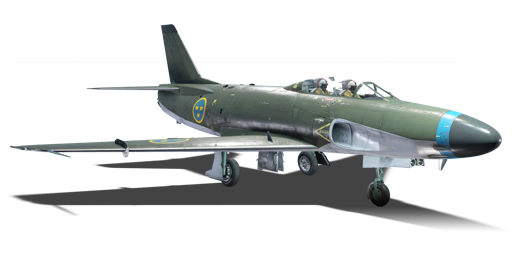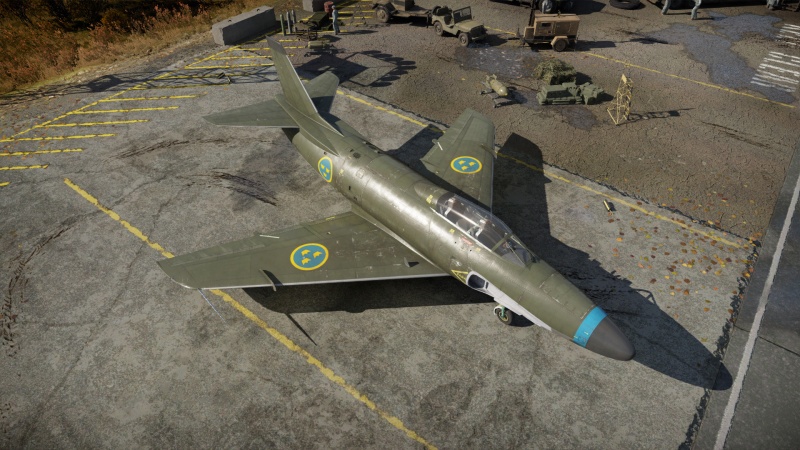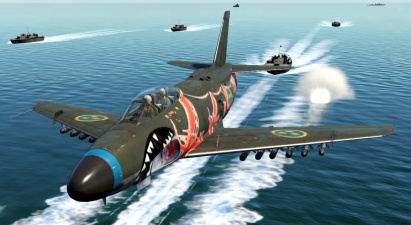Difference between revisions of "A32A"
Colok76286 (talk | contribs) (→Media: Updated WT Live link) |
Bonisducks (talk | contribs) (→History) (Tag: Visual edit) |
||
| Line 188: | Line 188: | ||
== History == | == History == | ||
| − | + | <!-- Describe the history of the creation and combat usage of the aircraft in more detail than in the introduction. If the historical reference turns out to be too long, take it to a separate article, taking a link to the article about the vehicle and adding a block "/History" (example: https://wiki.warthunder.com/(Vehicle-name)/History) and add a link to it here using the main template. Be sure to reference text and sources by using <ref></ref>, as well as adding them at the end of the article with <references />. This section may also include the vehicle's dev blog entry (if applicable) and the in-game encyclopedia description (under === In-game description ===, also if applicable). --> | |
| + | The A32A Lansen was the initial ground-attack variant of the Saab 32 ‘Lansen’ attacker / fighter aircraft. Designed to replace the obsolete propeller-powered Saab 18, the aircraft’s design was influenced by late-war German aircraft designs such as the P. 1101, P.1110, P.1111 and P.1112. The aircraft featured a conventional low-mounted swept-wing with a sleek fuselage housing a two-man crew, while the later J 32 fighter variant had a single crewmember. The A32A was introduced in 1955 with a total of 287 aircraft built for the attack role, serving until the end of the 1970s. | ||
| + | |||
| + | Following the end of the Second World War, the primary Swedish ground-attack aircraft was the obsolete Saab 18, a propeller-driven aircraft initially designed in the late 1930s. The initial design was influenced by late-war German aircraft designs such as the P. 1101, P.1110, P.1111 and P.1112, whose blueprints were given to Saab by former Messerschmitt engineers who fled to Switzerland. Among these engineers was Hermann Behrbohm, who would become a key contributor to the Saab 29, 32 and J 35 programs. | ||
| + | |||
| + | In terms of design, the A32A had a sleek fuselage with a low-mounted wing swept 35 degrees. The aircraft was powered by a Svenska Flygmotor RM5, which was a license-produced version of the Rolls-Royce Avon jet engine. This engine provided the A 32A with a thrust-to-weight ratio of ~0.3, while the later J32B fighter featured a heavily-upgraded RM6 engine producing significantly-more thrust. From the outset, the A32A was designed to house significant amounts of electronic warfare and weapons systems. The aircraft carried four 20 mm Oerlikon aircraft cannons in the nose, and could be fitted with unguided weapons including rockets and bombs up to 600 kg. The A32A could also carry two Rb 04 anti-ship missiles, one of the first cruise missiles to enter service. | ||
| + | |||
| + | In total, 287 A32A Lansens were produced for the Swedish Air Force between 1955 and 1957, replacing the Saab 18. The aircraft proved to be fairly reliable in service in terms of both aircraft and weapons systems. Additionally, the A32A was intended to carry nuclear weapons as part of Sweden’s nuclear program; these plans were shelved with the end of Sweden’s nuclear program. The A32A was Sweden’s last dedicated ground-attack aircraft; the last airframes were phased out in the 1970s in favour of the AJ 37 Viggen. | ||
== Media == | == Media == | ||
| Line 211: | Line 218: | ||
;Related development | ;Related development | ||
| + | |||
* [[J32B]] - Fighter variant of the aircraft. | * [[J32B]] - Fighter variant of the aircraft. | ||
Revision as of 01:11, 25 May 2021
| This page is about the Swedish strike aircraft A32A. For the fighter version, see J32B. |
Contents
Description
The A32A is a rank VI Swedish strike aircraft with a battle rating of 9.0 (AB/RB/SB). It was introduced in Update 1.95 "Northern Wind".
The A32A "Lansen" was designed and developed by the Swedish company SAAB. The development began in 1948 and it first flew in 1952. Deliveries to the Swedish air force, Flygvapnet, began in 1954. In Flygvapnet it was used as a ground-attack aircraft, being able to carry a large array of different bombs and unguided rockets as well as four 20 mm Akan m/49 canons. It remained in service until 1978 but never saw use in combat. Powered by a license-built Rolls Royce Avon engine, locally designated the RM5, it was able to break the speed of sound in a dive, thus becoming the first Swedish aircraft to fly faster than the speed of sound.
General info
Flight performance
| Characteristics | Max Speed (km/h at 0 m - sea level) |
Max altitude (metres) |
Turn time (seconds) |
Rate of climb (metres/second) |
Take-off run (metres) | |||
|---|---|---|---|---|---|---|---|---|
| AB | RB | AB | RB | AB | RB | |||
| Stock | 1,088 | 1,084 | 12500 | 34.6 | 35.6 | 44.8 | 42.0 | 900 |
| Upgraded | 1,101 | 1,094 | 33.6 | 34.0 | 66.2 | 55.0 | ||
Details
| Features | |||||
|---|---|---|---|---|---|
| Combat flaps | Take-off flaps | Landing flaps | Air brakes | Arrestor gear | Drogue chute |
| ✓ | ✓ | ✓ | ✓ | X | X |
| Limits | ||||||
|---|---|---|---|---|---|---|
| Wings (km/h) | Gear (km/h) | Flaps (km/h) | Max Static G | |||
| Combat | Take-off | Landing | + | - | ||
| 1160 | 450 | 524 | 491 | 320 | ~11 | ~5 |
| Optimal velocities (km/h) | |||
|---|---|---|---|
| Ailerons | Rudder | Elevators | Radiator |
| < 850 | < 600 | < 600 | N/A |
Engine performance
| Engine | Aircraft mass | ||||||
|---|---|---|---|---|---|---|---|
| Engine name | Number | Basic mass | Wing loading (full fuel) | ||||
| Svenska Flygmotor RM5A | 1 | 8,322 kg | 297 kg/m2 | ||||
| Engine characteristics | Mass with fuel (no weapons load) | Max Takeoff Weight | |||||
| Weight (each) | Type | 14m fuel | 20m fuel | 30m fuel | 46m fuel | ||
| 1,350 kg | Afterburning axial-flow turbojet | 9,163 kg | 9,523 kg | 10,123 kg | 11,084 kg | 13,500 kg | |
| Maximum engine thrust @ 0 m (RB / SB) | Thrust to weight ratio @ 0 m (WEP) | ||||||
| Condition | 100% | WEP | 14m fuel | 20m fuel | 30m fuel | 46m fuel | MTOW |
| Stationary | 3,424 kgf | 4,633 kgf | 0.51 | 0.49 | 0.46 | 0.42 | 0.34 |
| Optimal | 3,424 kgf (0 km/h) |
4,899 kgf (1,000 km/h) |
0.53 | 0.51 | 0.48 | 0.44 | 0.36 |
Survivability and armour
- 10 mm Steel - Pilots' seats
- 50 mm Bulletproof glass - Windscreen
- 15 mm Steel - In front of forward pilot
- 5 mm Steel - Below forward pilot
- Self-sealing fuel tanks (8 in each wing, 4 in the fuselage)
Modifications and economy
Armaments
| Ballistic Computer | |||
|---|---|---|---|
| CCIP (Guns) | CCIP (Rockets) | CCIP (Bombs) | CCRP (Bombs) |
| |
|
|
|
Offensive armament
The A32A is armed with:
- 4 x 20 mm Akan m/49 cannons, nose-mounted (180 rpg = 720 total)
Suspended armament
The A32A can be outfitted with the following ordnance:
- Without load
- 12 x 120 kg sb m/61 bombs (1,440 kg total)
- 5 x 250 kg mb m/50 bombs (1,250 kg total)
- 3 x 500 kg mb m/56 bombs (1,500 kg total)
- 3 x 600 kg mb m/50 bombs (1,800 kg total)
- 24 x psrak m/49A rockets
- 24 x srak m/51 rockets
- 12 x hprak m/49 rockets
Usage in battles
In Air Realistic Battles, the A32A can make very effective use of its available bombs. The 3 x 600 kg m/50 bombs deliver 480 kg of explosive mass each, which is more than enough to destroy a base at its tier. The aircraft has sufficient speed to outrun any enemy attackers in the initial phase of the match, and can generally drop its bombs on at least one base, if sufficient at avoiding Su-7s and/or Harriers. From there onwards, it's recommended to either return to the airfield, or pick off targets using the tactic described below.
An alternative route is the traditional fighter route. The A32A has an attacker spawn, and as a result may pursue enemy attackers, including but not limited to AV-8 Harriers, Yak-38s, Vautour bombers, and the easiest target, the A-4E. The aircraft has mediocre manoeuvrability compared to its tier, but has quite decent energy retention, and can be effective if used as a boom and zoom aircraft, maintaining speed as much as possible. Unlike the fighter variant, the J32, the A32 does not have missiles. This makes it entirely reliant on 4 x 20 mm cannons, which are sufficient in taking down anything that they hit. Be warned, the cannons have a finnicky placement on the bottom of the aircraft, and take some getting used to. The elevator will also lock up at high speeds, which can be a problem.
Pros and cons
Pros:
- Good climb rate
- Fast top speed
- Has 4 powerful nose-mounted cannons with high rate of fire, giving good one-second burst mass
- Good roll rate
- Fowler flap design provides excellent lift at low speeds
- Has a wide range of bombs and rockets loadouts, beneficial in tank RB
- Has decent pilot protection & airframe endurance
- Radar warning receiver
Cons:
- Mediocre manoeuvrability, almost every opponent it faces can outmanoeuvre it
- Very inefficient airbrake design that requires high angle-of-attack or aggressive banking to slow down
- Large target making it easy to get hit
- High rate of fire with low ammo count (90 RPG): ammunition will deplete very quickly, strict trigger control required
- Can be difficult to land as landing flaps rip above 300 km/h
History
The A32A Lansen was the initial ground-attack variant of the Saab 32 ‘Lansen’ attacker / fighter aircraft. Designed to replace the obsolete propeller-powered Saab 18, the aircraft’s design was influenced by late-war German aircraft designs such as the P. 1101, P.1110, P.1111 and P.1112. The aircraft featured a conventional low-mounted swept-wing with a sleek fuselage housing a two-man crew, while the later J 32 fighter variant had a single crewmember. The A32A was introduced in 1955 with a total of 287 aircraft built for the attack role, serving until the end of the 1970s.
Following the end of the Second World War, the primary Swedish ground-attack aircraft was the obsolete Saab 18, a propeller-driven aircraft initially designed in the late 1930s. The initial design was influenced by late-war German aircraft designs such as the P. 1101, P.1110, P.1111 and P.1112, whose blueprints were given to Saab by former Messerschmitt engineers who fled to Switzerland. Among these engineers was Hermann Behrbohm, who would become a key contributor to the Saab 29, 32 and J 35 programs.
In terms of design, the A32A had a sleek fuselage with a low-mounted wing swept 35 degrees. The aircraft was powered by a Svenska Flygmotor RM5, which was a license-produced version of the Rolls-Royce Avon jet engine. This engine provided the A 32A with a thrust-to-weight ratio of ~0.3, while the later J32B fighter featured a heavily-upgraded RM6 engine producing significantly-more thrust. From the outset, the A32A was designed to house significant amounts of electronic warfare and weapons systems. The aircraft carried four 20 mm Oerlikon aircraft cannons in the nose, and could be fitted with unguided weapons including rockets and bombs up to 600 kg. The A32A could also carry two Rb 04 anti-ship missiles, one of the first cruise missiles to enter service.
In total, 287 A32A Lansens were produced for the Swedish Air Force between 1955 and 1957, replacing the Saab 18. The aircraft proved to be fairly reliable in service in terms of both aircraft and weapons systems. Additionally, the A32A was intended to carry nuclear weapons as part of Sweden’s nuclear program; these plans were shelved with the end of Sweden’s nuclear program. The A32A was Sweden’s last dedicated ground-attack aircraft; the last airframes were phased out in the 1970s in favour of the AJ 37 Viggen.
Media
- Skins
- Images
- Videos
See also
- Related development
- J32B - Fighter variant of the aircraft.
External links
| Swedish Aeroplane Company Ltd. (SAAB) | |
|---|---|
| Pre-SAAB: SA / ASJA | |
| SA 'Jaktfalken' | J6B |
| SAAB 17 | B17A · B17B · S17BS |
| SAAB 18 | B18A · B18B · T18B · T18B (57) |
| SAAB 21 | J21A-1 · J21A-2 · A21A-3 · J21RA · A21RB |
| SAAB 29 'Tunnan' | J29A · A29B · J29D · J29F |
| SAAB 32 'Lansen' | J32B · A32A · A32A Röd Adam |
| SAAB 35 'Draken' | J35A · J35D |
| SAAB 37 'Viggen' | JA37C · JA37D · JA37DI · JA37DI F21 · AJ37 · AJS37 |
| SAAB 39 'Gripen' | JAS39A · JAS39C |
| SAAB 105 | SK60B · SAAB-105G |
| License Production | B3C (Ju 86K) |
| Export | SAAB-105OE · J35XS · ▄JAS39C · ◔JAS39EBS HU C |
| Sweden jet aircraft | |
|---|---|
| Fighters | J21RA |
| J29A · A29B · J29D · J29F | |
| J32B | |
| J34 | |
| J35A · J35D | |
| JA37C · JA37D · JA37DI · JA37DI F21 | |
| JAS39A · JAS39C | |
| Strike aircraft | A21RB |
| A32A · A32A Röd Adam | |
| A28B | |
| AJ37 · AJS37 | |
| SK60B · SAAB-105G | |
| Export | SAAB-105OE |
| Finland | ▄Vampire FB 52A · ▄MiG-21bis · Saab J35XS |






